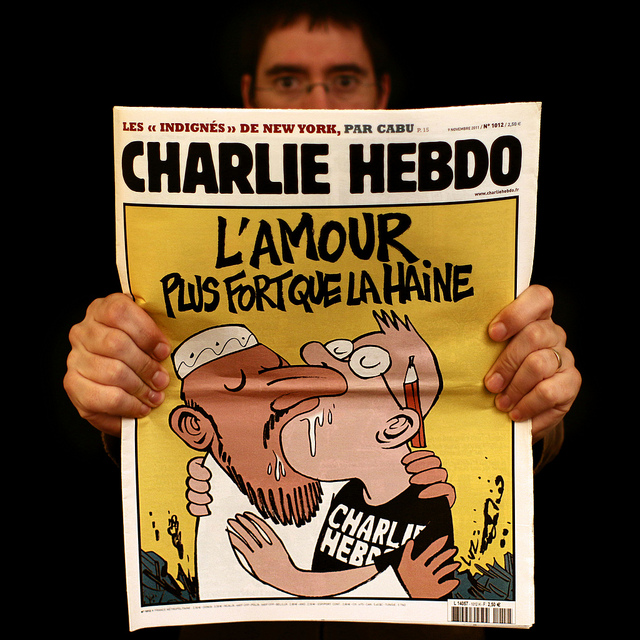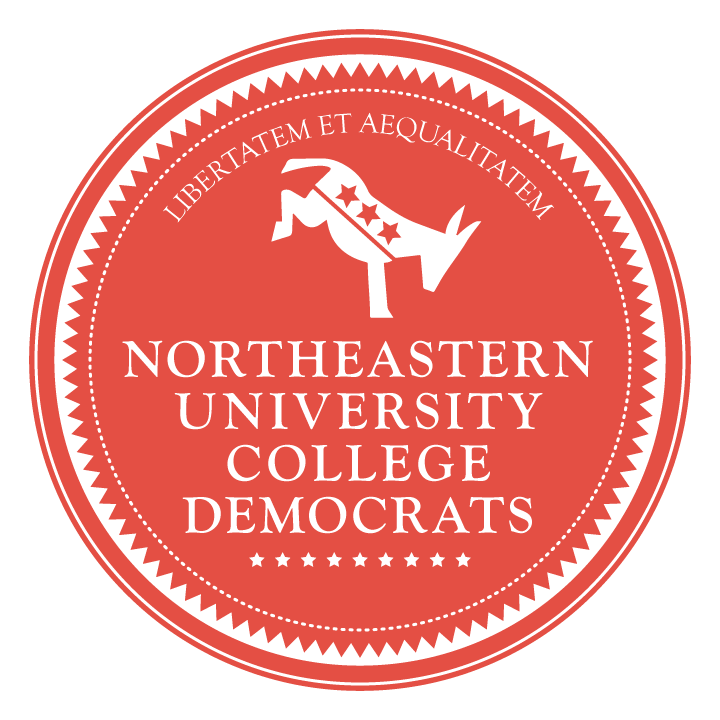On January 7th, Paris and some of its surrounding municipalities fell victim to a series of terror attacks, including fatal shootings at the Charlie Hedbo offices, a kosher supermarket, and the killing of a police woman.[1] In the Charlie Hebdo attack, twelve individuals lost their lives; at the Hyper Cacher Supermarket, four hostages were killed.[2] On February 26th, members of the Northeastern community met for a panel discussion on the events. The panel was led by Max Abrahms (Political Science), Val Moghadam (International Affairs and Sociology), Shakir Mustafa (World Languages Center), Gordana Rabrenovic (Sociology), and Dov Waxman (Political Science).
The event was introduced by Dr. Moghadam, who described what set the stage for the Paris Attacks. Dr. Moghadam’s first point was that we live in a world where the U.S. has a huge impact in the Middle East. Dr. Moghadam states that The United States has overthrown governments, launched drone strikes, and invalidated the sovereignty of states. She argued this has contributed to the spread of jihadism. Dr. Moghadam pointed out that conflict has arisen due to the fact that the current Syrian Civil War has been supported by the U.S., France, and their allies. These western powers have only added to the conflict and confusion in the region. Dr. Moghadam’s third point was in regard to the Arab-Israeli conflict. She argued that this has also contributed to the Paris Attacks. Arab-Israeli conflict is a source of contempt for young muslims. Muslim families who have immigrated to European countries are at a socioeconomic disadvantage. In France, Muslim applicants are less likely to receive job interview callbacks than similar applicants who are Christians.[3] Due to the ongoing Arab-Israeli conflict, Arabs and Palestinians have deep feel they are deprived of their rights to livelihood and opportunity. These feelings are reinforced in France when Muslims are denied equal opportunity at employment and socioeconomic stability. Dr. Moghadam’s final point was that the poor economy in the Middle East has had a large negative impact on the poor and middle-class. Recessions and market crashes have left many families, like the Kouachi brothers who carried out the Charlie Hebdo attack, struggling. Dr. Moghadam concluded by stating that “jihadism is a result of foreign politics and cancerous beliefs within Islam.”
Dr. Gordana Rabrenovic discussed the politics of the Paris Attacks. The Paris attacks accentuated the religious divide in France. In the context of minority life in Paris, Dr. Rabrenovic discussed the bleak economic outlook for minority youth in Paris. Children of immigrants and refugees that grow up in the EU expect to be treated equally, but that is not the case. There is a belief that multiculturalism in immigration is to blame for conflict. Dr. Rabrenovic argued that the poor economic outlooks for minorities in France, and the European Union in general, contributes to violent acts like the Paris Attacks. The EU pits countries together in competition for jobs, and minorities are abandoned.
Dr. Max Abrahms analyzed the school of thought within ISIS. He constructed two schools of thought in relation to the extremist principles of the group: the “A Clockwork Orange” and “Battle of Algiers” mentalities. The former involves fear mongering, which is widely perpetrated by our media. The Clockwork Orange perspective is, similar to the plotlines of Anthony Burgess and Stanley Kubrick, that terrorism has no goals, and terrorist acts are conducted purely to cause panic and consternation. Dr. Abrahms argued that this is not necessarily the way ISIS is operating. It is widely believed among academics that ISIS subscribes to the Battle of Algiers school of thought – the idea that groups turn to terrorism in the belief that it has the most influence on politics. This implies that terrorism is a rational, political strategy. However, if we define non-state actors as people who use terrorism against civilians, then we see that this does not actually work in their favor. While their goals are intimidation, acts of terror by organizations such as ISIS actually cause defiance among governments and citizens. These attacks create a temporary unity among citizens and strengthens anti-terror policies. The rebellion against these attacks is seen in governments throughout the world. With increasing terror attacks in Canada, they have proposed an anti-terrorism bill that will essentially give the country’s surveillance agency free reign, under the guise of preventing terrorism.[4] Following a terrorist attack in a Sydney, Australia cafe, new restrictions against “potential threats” have been proposed. Prime Minister Tony Abbott is planning on revoking welfare, dual nationality, and overseas travel in cases where citizens deem these potential threats.[5] Out of spite, Prime Minister Tony Abbott has even started referring to ISIS as “Daesh”— a term it reportedly hates.[6] These measures are ripple effects of terrorist attacks on western soil. In the Middle East, Jordan has taken a huge stance against ISIS after the heinous murder of Jordanian pilot, Lt. Moath al-Kasasbeh. King Abdullah II has begun to unleash Jordan’s military upon ISIS, and has led the country to join the US-led military-coalition against ISIS.[7] Egypt has launched multiple airstrikes against ISIS after a video released by the organization showed the brutal beheadings of Egyptian Christians.[8][9] Dr. Abrahms posited that, overall, these responses have shown that terrorism does not advance the ambitions of the organization and while terrorism may not be strategic, that does not necessarily mean it is irrational. ISIS is using this violence to appeal to essentially otherwise rational people and further their goal. Dr. Abrahms concludes that ISIS’ use of terrorism is rational in the sense that it uses it as an organizational strategy, not a political one.
Dr. Dov Waxman explains the anti-semitic aspects of the Paris Attacks. While the Charlie Hebdo events were a clear attack against blasphemy and freedom of speech, Waxman asks what, other than being Jewish, were the crimes of the individuals at the kosher market? Dr. Waxman acknowledges that this not the first terrorist attack against Jews, but rather the latest. He argues that jihadism is a central belief in jihadism. This radical islamist ideology is inspiring jihadists to carry out attacks in Europe. Dr. Waxman argues that these attacks are mainly carried out by Muslim youths as a result of politics and social resentment. Attacks are also driven by social resentment against French Jews who are perceived to be a more privileged and successful minority in France. France has the largest Muslim and Jewish minority populations living side-by-side outside of Israel, however it is seen by Muslims that in France, the Jewish minority has a better life. Dr. Waxman concludes by stating that the growth of jihadism in Europe poses a threat to the security of Jews in general. However, there is not an “exodus” of French Jews such as the media broadcasts. The media grossly exaggerates the desires of Jews to leave Europe and makes weak comparisons to the 1930s and 40s. Dr. Waxman states that there is a fundamental difference between state-sponsored anti-semitism and the social anti-semitism we are seeing today. Europe has changed, and the reactions of anti-semitism from governments and civilians is different.
Dr. Val Moghadam discussed free speech versus hate speech. She argues that countries such as U.S., France, Denmark, and the UK are becoming more multicultural but organizations like Charlie Hebdo still attack religion. Dr. Moghadam points out that holocaust denial is illegal in 13 EU countries, and yet there is nothing stopping the insult of Prophet Mohammed and states that people need to come together to promote civility and notions of equality. Trumped up apostasy and blasphemy charges have lead to deaths in Pakistan, and harsh punishments in Saudi Arabia, and while Obama speaks of the importance of human rights, he dares not criticize Saudi Arabia. Dr. Moghadam argues that a muslim cannot openly free his or herself or analyze Islam in fear of these punishments. Some muslims even claim to be secular or culturally muslim, so as not to not appear to be denying their islamic heritage. Dr. Moghadam expresses that muslims should be able to deny their faith, and live. She concludes by stating that although free speech is necessary, conflicts such as those seen in Paris arise from negative intolerance and disrespect of religion.
Dr. Shakir Mustafa concludes the forum by discussing muslims and the terrorism conversation. He argues that there is a reinvention of western islamophobia. There is widespread discrimination against Muslims, especially in the EU. This can be seen in Austria, a country which currently prohibits the foreign funding of mosques, while Christians and Jews face no such restrictions. The trivialization of Muslim communities is an aspect of islamophobia that needs to be combated. Muslims are portrayed in media as weak and are dismissed. Movies like American Sniper promote hate within the western culture. Events like the Chapel Hill murders gain more attention from social, rather than traditional news, media.. Dr. Mustafa argues that the representation of the prophet Mohammed is not a problem, but that satirical representations are what cause conflict. He proved this by showing a variety of ancient artifacts that essentially depicted every aspect of the prophet’s life. He concludes with the fact that the flattening of Muslim’s reactions to Mohammed cartoons is an aspect of the current pandemic of western islamophobia.
The forum ended by opening the floor to questions and a general discussion. Important points were made in regards to recruitment of terrorist organizations. In western media, there is a great emphasis on social media recruitment. However, it is important to note that this does not work as a large-scale recruitment tactic. Groups like Boko Haram are massive compared to ISIS, and they just only started employing social media in their recruitment. Battlefield success is a much better recruiter than social media. The use of the term “jihadism” was also brought up. Who defines jihadism? The presenters generally agreed that the term jihadism is used by the actors themselves, and that we should not avoid the term. We also should not bend over backwards to appease them, especially when we distinguish jihadism from Islam and Muslims in general. The Paris Attacks discussion analyzed many aspects of terrorism and discussed modern terrorism in France and abroad. While we can argue about what inspires terrorism, we must remember: violent extremism such as the Paris Attacks is not representative of cultures or religions.



